
By Mykal Kaminski
It was a shocking headline. During the month of June, 2020, a CDC report estimated more than a quarter of young American adults (18-24-year-olds) and nearly a third of caregivers for adults seriously considered suicide. If you or anyone you know is facing a mental health crisis, click here for immediate assistance. These sad statistics from the Centers for Disease Control and Prevention’s Morbidity and Mortality Weekly Report show just how great a toll the Covid-19 pandemic is taking on our mental health. The CDC also noted that substance abuse numbers are also up, as people try to trying to cope in unfortunately unhealthy ways.
There appear to be three major ways the pandemic is affecting mental health, but the good news is that there are a wide range of accessible mental health tools that can help alleviate suffering; one just needs to know where to look and be willing to ask for help. Let’s look over these top three problems and then address strategies for tacking them.
- Loneliness
This might sound like a minor issue, but almost all of us crave human connections. It’s wired into us. And feeling lonely is a separate issue from being lonely. You might have your spouse and kids around you, but not having access to important friends could cause feelings of emptiness.
- Insomnia
Not knowing how to plan for the future makes nearly everyone anxious, and anxiety often fuels insomnia. You might be stuck at home and have plenty of time to nap or sleep, but feeling unhappy, lonely and scared is making sleep difficult for many. Couple these feelings with the real fear faced by far too many that their job could soon be gone or greatly reduced and sleep – which is essential for cleaning toxins from both body and brain – can become nigh impossible. Those suffering from insomnia are living a vicious cycle that can push some into the third big problem: full-blown depression.
Depression – in all its forms

People across the world are reporting increased feelings of stress, anxiety, PTSD, and other forms of feelings that lead to depression. This pandemic has gone on for what seems to be an eternity and, while our rational mind knows it will one day be something we read about in history books, no remedy seems to be just around the corner. Sure, some react well to motivational posters with slogans such as “Life is Tough: Are You?” but for others, the call to become more resilient rings hollow. How can you ‘pull yourself up by your bootstraps’ if you don’t feel you’ve even got boots on?
Sadly, the numbers show these top three metal health issues are fueling violence of all kinds. At a location about 100 miles from where the pandemic reportedly originated, Wuhan, China, police recorded that domestic abuses case were three times higher in February 2020 compared to February 2019. In New Orleans, domestic aggravated assault jumped 37 percent since lockdowns began.
Don’t let the Covid blues turn into something tragic. For starters, now is a time to be kinder to yourself. You’re not “weak” for feeling anxious in anxious times. Resist the temptation to kick yourself while you’re down for not being more resilient. A select few might be able to “self-improve” their way to better mental health, but most us are going to need help. And that’s absolutely ok.
One huge key strategy is seeking out real information, but not too much. The news might be taking about “Covid waves” in your area, but knowing the actual numbers and in what areas could help set your mind at ease. If, however, you find yourself spending hours on news sites or social media dwelling on all things Covid, consider cutting back. Knowledge is power, but too much knowledge is an overload you don’t need and may even be counter-productive. If you find yourself feeling uneasy after binge-watching the news or spending too long on Facebook, consider limiting these sources of info to a set period of time per day.
Next – and this can’t be stressed enough – connect. It’s easy to think about video-calling an old friend or that relative we’re fond of – but too many of us just don’t. Be honest. “Hey, just wanted to chat and see how you’ve been…plus, I think I need to talk to someone other than my spouse.”
Finally, if you feel things are starting to slip out of control, consider online therapy. It’s possibly the only way you might be able to get professional help during a lockdown and it’s cheaper, you have more choices, it’s more private and scientific research says it works.
There’s an old story about a woman who always said, “And it came to pass” which was her favorite line of Biblical scripture. Asked why, she replied, “It comforts me knowing that whatever comes, it comes to pass.” This pandemic will one day pass, and we’re all going to get through it with a little help from our friends. This is the story that will be told to our descendants, how we, in this time, found strength in ourselves and our communities and overcame.
–
John Jullu says
Wellsprings Nursing Home has like 45 patients who have COVID 19. They are having a super outbreak and I heard all the administrative staff didn’t even show up to work one day!
Lily says
I will say to the Lord, “My refuge and my fortress, my God, in whom I trust.”
Diana says
I think the number one thing that can affect your mental and physical health is having to live in Commiefornia!
Seriously says
Nobody HAS TO live in California.
People leave all the time.
Other states cheaper.
Go for it.